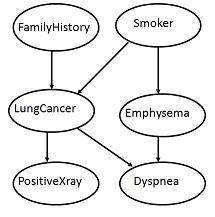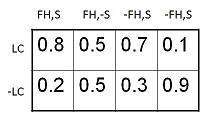Data Mining - Bayesian Classification
Bayesian classification is based on Bayes' Theorem. Bayesian classifiers are the statistical classifiers. Bayesian classifiers can predict class membership probabilities such as the probability that a given tuple belongs to a particular class.
Baye's Theorem
Bayes' Theorem is named after Thomas Bayes. There are two types of probabilities −
- Posterior Probability [P(H/X)]
- Prior Probability [P(H)]
where X is data tuple and H is some hypothesis.
According to Bayes' Theorem,
Bayesian Belief Network
Bayesian Belief Networks specify joint conditional probability distributions. They are also known as Belief Networks, Bayesian Networks, or Probabilistic Networks.
- A Belief Network allows class conditional independencies to be defined between subsets of variables.
- It provides a graphical model of causal relationship on which learning can be performed.
- We can use a trained Bayesian Network for classification.
There are two components that define a Bayesian Belief Network −
- Directed acyclic graph
- A set of conditional probability tables
Directed Acyclic Graph
- Each node in a directed acyclic graph represents a random variable.
- These variable may be discrete or continuous valued.
- These variables may correspond to the actual attribute given in the data.
Directed Acyclic Graph Representation
The following diagram shows a directed acyclic graph for six Boolean variables.

The arc in the diagram allows representation of causal knowledge. For example, lung cancer is influenced by a person's family history of lung cancer, as well as whether or not the person is a smoker. It is worth noting that the variable PositiveXray is independent of whether the patient has a family history of lung cancer or that the patient is a smoker, given that we know the patient has lung cancer.
Conditional Probability Table
The arc in the diagram allows representation of causal knowledge. For example, lung cancer is influenced by a person's family history of lung cancer, as well as whether or not the person is a smoker. It is worth noting that the variable PositiveXray is independent of whether the patient has a family history of lung cancer or that the patient is a smoker, given that we know the patient has lung cancer.
